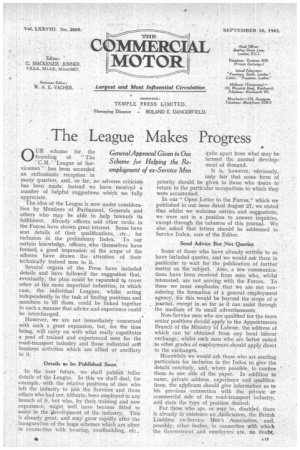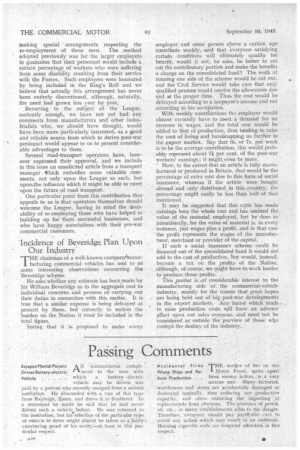The League Makes Progress
Page 17

Page 18

If you've noticed an error in this article please click here to report it so we can fix it.
OUR scheme for the founding of "The ' C.M. ' League of Servicemen" has been accorded an enthusiastic reception in many quarters, and, so far, no adverse criticism has been made; instead we have received a number of helpful suggestions which we fully appreciate.
The idea of the League is now under considera tion by Members of Parliament, Generals and others Who may be able to help towards its fulfilment. AlreadY. officers arid other ranks in the Forces have shoWti great interest. Some have sent details of their qualifications, etc., for inclusion iri the preliminary Index. To our certain knowledge, officers,.who themselves have formed, a good impression of the scope of the scheme have drawn. the attention of their technically trained men to it.
Several organs of the Press have included details and have followed the suggestion that, eventually, the plan could be expanded tq cover other of the more important industries, in which case, the individual Leagues, whilst acting independently in the task of finding positions and members to fill them, could be linked together in such a manner that advice and experience could be interchanged.
However, vre are not immediately concerned with such a great expansion, but, for the time being, will carry on with what really constitutes a pool of trained and experienced men for the road-transport industry and those industrial anti business activities which are allied or ancillary to it.
Details to be Yublished Soon ' In the near future, we shall publCSIC fuller details of the League. In this we shall deal, for example,' with the relative positions, of rrien who left the industry to join the Services and those others who had not, hitherto, been employed-in any branch of it, but who, by their, training and new experience, might well have become fitted to assist in the hlevelopment of the industry. This is already great, and may' grow rapidly after the inauguration of the hnge schemes which are afoot in connection with housing, roadbuilding, etc., quite apart from what may be termed the normal development of demand.
It is, however, obviously, only fair', that some form of priority should be given to those who desire to return to the particular occupations to which they were accustomed.
In our" Open Letter to the Forces," which we published in our issue dated August 27, we stated that whilst we welcome entries and suggestions, we were not in a position to answer inquiries, except-through the 'columns ot this journal. We also asked that letters should be addressed to Service Index, care of the Editor.
• Send Advice But ,Not Queries . Some of those who have already writtk to us have included queries, and we would ask them in particular to wait for the publication of further matter on the 'subject. • Also, a few communications have been received from men who, whilst interested, are not serving with the Forces. To these we must emphasize ,that we are not considering the formation of a general 'employment agency, fiir this would be beyond the scope of ajournal, except in,so far as it can assist through the medium of its small advertisements.
Non-Service men who are qualified forthe more senior positions should applyto the Appointments Branch of the Ministry 'of Labour, the address of which can be' obtained from any local labour exchange, whilst such men who are better suited ,to other grades of employment should apply direct to the exchanges.
Meanwhile we would ask those who are sending particulars for inclusion in the IndeX to give the details concisely, and, where possible, to confine ' them to one side of the paper. In addition to name, private address, experience and qualifications, the aj5plicant should give information as to his previous connection with the private or commercial side of the road-transport industry, arid state tbe type of position desired.
For those who are, or may be, disabled, there is already in existence an AssOciation, the British Limbless ex-Service Men's Association, and, possibly, other bodies, in connection with which the Government and employers are, no doubt, making special arrangements respecting the re-employment of these men. The method adopted previously was for the larger employers to guarantee that their personnel would include a certain percentage of workers who were suffering from some disability resulting from their service with the Forces. Such employers were honoured by being included in the King's Roll and we believe that actually this arrangement has never been entirely discontinued, although, naturally, the need had grown less year by year.
Reverting to the subject of the League, curiously enough, we have not yet had any comments from manufacturers and other indusirialists who, we should have thought, would have been nore particularly interested, as a good and reliable source from which to derive post-war pers.-04nel would appear to us to present considerable advantages to them.
Several road-transport operators have, however expressed their approval, and we include in this issue an unsolicited article from a transport manager *hich embodies some valuable comments, not only upon the League as such, but upon.the influence which it might be able to exert upon the future of road transport.
One particular point from this contribution that• appeals to us is that operators themselves should welcome the League, having in mind the desirability of re-employing those who have helped in building up for them successful businesses, and who have happy associations with their pre-war commercial customers.
"Incidence of Beveridge Plan Upon Our Industry
THE chairman of a well-known companOnanufacturing commercial vehicles has sent to us some interesting observations concerning the Beveridge scheme.
He asks whether any estimate has been made by Sir William Beveridge as to the aggregate cost to individual concerns and persons ofcarrying out their duties in connection with this matter. It is true that a similar expense is being defrayed at present by them, but correctly to reckon the ' burden on the Nation it must be included in the total figure.
Seeing that it is proposed to make every employer and other person above a certain age contribute weekly, and that 'everyone satisfying certain Conditions will ultimately qualify for benefit, would it not, he asks, be better to cut out the contributory portion and make the benefits a charge on the consolidated fund? The work of running one side of the scheme would be cut out, and the Civil Service would take care that only qualified persons would receive the allowances due and at the proper time. Thus the cost would be defrayed according to a taxpayer's income and not according to his occupation.
With weekly contributions the employer would almost certainly have to meet a demand for an increase in wages, and the total cost would be added to that of production, thus tending to raise the cost of living and handicapping us further in the export market. Say that Os. or 7s. per week is to be the average contribution, this would probably represent about Th per cent. of the post-war workers' earnings; it might,even be more. Now, to the extent that an article is fully manufactured or produced in Britain, that would be the percentage of extra cost due to this form of social insurance, whereas if the article were bought abroad and only distributed in this country, the percentage might easily be less than half of that mentioned.
It may be suggested that this critic has made earnings bear the whole cost and has omitted the value of the material employed, but he does so intentionally, for the value of material is, in every instance, just wages plus a profit, and in that case the profit represents the wages of the manufacturer, merchant or provider of the capital.
If such a social insurance scheme could be financed out of the consolidated fund it would not add to the cost of production, but would, instead, become a tax on the profits of the Nation, although, of course, we might have to work harder to produce those profits.
This patter is .of considerable interest to the manufacturing side of the commercial-vehicle industry, mainly for the reason that. great hopes are being held out of big post-war developments in the export markets. Any factor which tends to raise production costs will have an adverse effect upon our sales overseas, and must not be considered as outside the purview of those who control the destiny of the industry.




















































